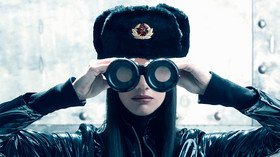New Cold War dangers: More potentially explosive Russia-US conflicts likely to come – Stephen Cohen
The Russian-Ukrainian military conflict in the Kerch Strait illustrates again how this Cold War is more dangerous than its predecessor was.
A major theme of Cohen's recently published book 'War With Russia? From Putin and Ukraine To Trump and Russiagate', is that the new Cold War is more dangerous in several ways than its 40-year predecessor, which the world survived. Two of these new perils were demonstrated on November 25 when Russia forces fired on and seized small Ukrainian military vessels in disputed territorial waters near the recently built Kerch Bridge connecting mainland Russia with annexed Crimea.
The episode involved two unprecedented factors in Cold War history. Unlike the preceding Cold War, whose political epicenter was in faraway Germany, this one has unfolded directly on Russia's borders, most existentially in Ukraine. Indeed, the Kiev government is in effect a US-NATO client regime. Thus, a "border incident," as Russian President Putin called the Kerch episode, could trigger a general war between Russia and the West.
Second, during the 40-year Cold War, US presidents were expected and able to negotiate with their Kremlin counterparts in order to defuse such crises, as JFK famously did during the 1962 Cuban Missile Crisis. But due to Russiagate allegations that Donald Trump colluded with the Kremlin to attain the presidency in 2016, despite as yet the lack of any evidence, President Trump was unable or unwilling to do so. Instead, as a result of the Kerch episode, he canceled a scheduled meeting with Putin. That is, a crisis that made such a meeting imperative was instead, due to the state of American politics, the cause of its cancellation. The larger result was the further militarization of the new Cold War at the expense of diplomacy, a theme discussed at some length here.
Kerch is unlikely to be the last such potentially explosive conflict between Washington and Moscow along Russia's borders, very possibly again in Ukraine, a result of NATO's still ongoing expansion to the east. If President Trump is not fully empowered to conduct crisis negotiations with the Kremlin, as every president since Eisenhower has been, the next episode may not be so limited and quickly resolved, if in fact this one has been.
READ MORE: Kiev’s martial law is cover for offensive action against rebels – Moscow
This explains another theme of 'War With Russia?': Russiagate allegations and their promoters have become a grave threat to American national security, both by impeding Trump and by further demonizing Putin, which was on full display in prosecutorial mainstream US media accounts of the Kerch episode. Not surprisingly, few of these accounts focused on the significance of Ukrainian President Poroshenko's use of the Kerch episode to impose martial law on Ukrainian regions that are least likely to vote for him in the upcoming March 2019 presidential election – or whether bolstering his failing electoral chances was his motive in provoking the maritime conflict. (In the parliamentary struggle that limited martial law, Poroshenko's would-be presidential rivals were far less reticent in this regard.)
Cohen ends with a personal memory of how the late President George H.W. Bush made policy toward Soviet Russia. In November 1989, faced with divided opinion as to whether to continue President Reagan's pro-détente relationship with the Soviet Union under Mikhail Gorbachev or to resume Cold War policies, Bush convened a debate between opposing views at Camp David attended by virtually his entire national security team. Cohen was invited to present the argument for a radical détente policy, with the late Harvard Professor Richard Pipes presenting the opposing view.
Also on rt.com US Navy sends ship to Russia’s Far East, reportedly prepares to enter Black SeaIt was clear that President Bush wanted to hear the most divergent scholarly opinions at a crucial moment in relations with Moscow, to his great credit. There is no evidence that Presidents Clinton, George W. Bush, or Obama felt any such need, which is a major reason Washington is now engaged in a new and more dangerous Cold War with Moscow. Herein lies a lesson for President Trump.
Stephen F. Cohen is a professor emeritus of Russian studies and politics at New York University and Princeton University and a contributing editor of The Nation.
This article was originally published by The Nation.
Think your friends would be interested? Share this story!
The statements, views and opinions expressed in this column are solely those of the author and do not necessarily represent those of RT.













